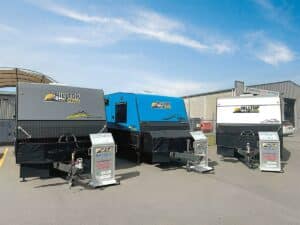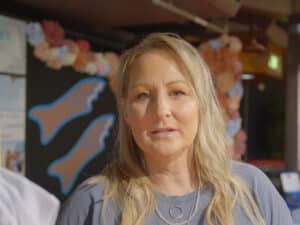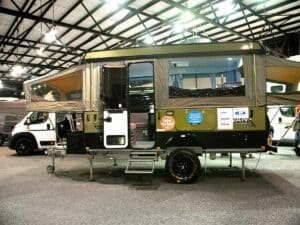
Midway through a highflying career in the Royal New Zealand Air Force, Gavin Mackenzie started selling crafts at gypsy fairs at the weekends. Before long, he decided the lifestyle was for him, and it was goodbye to the military and hello life on the road.
How did the lifestyle come about?
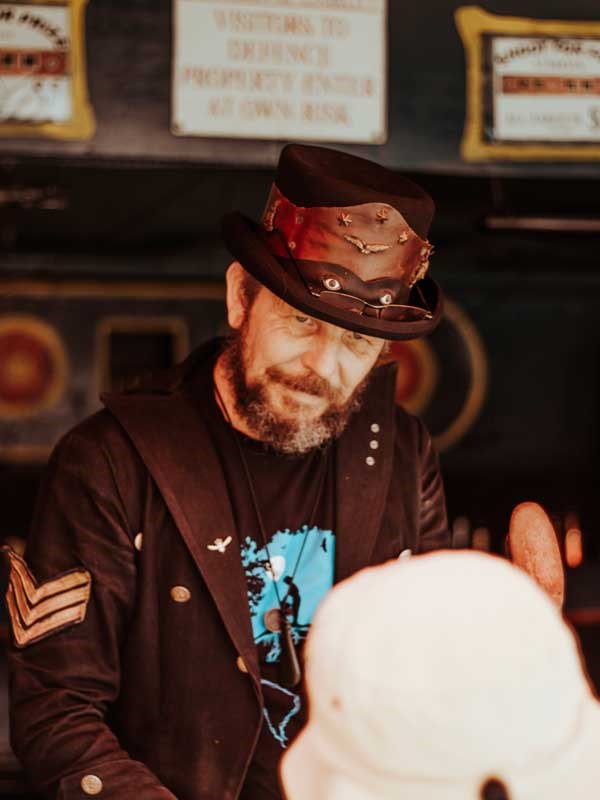 |
Gavin Mackenzie |
In 1995, when I was posted to Whenuapai, I started doing markets in Auckland, really just to subsidise the pay, which wasn’t that flash. My wife at the time was making handicrafts. I was cutting stuff out of MDF wood, and she was painting them, making things like fridge magnets.
Then The Gypsy Fair came to town. We took a stall, and we were hooked. For the first five years, we lived on the base during the week and went to fairs at the weekend. Some 25 years and 725 fairs later, I’m still here.
Being a military man, how did your creative side develop?
I grew up on a dairy farm in Taranaki, and I’d be given a pile of bent nails and offcuts of wood, and I’d just make things. Farm kids are always creating something from hay or hedges or chopping up bits of wood and putting them together to make karts. This is back in the mid-1970s, so there was no Warehouse or Kmart.
How did farm life lead to a career in the RNZAF?
The air force had been my calling ever since I read Reach for the Sky. Douglas Bader was very inspiring. But I wasn’t a pilot, I was an armourer, looking after weapons systems. Anything that exploded fell into my department. Assembling weapons, loading or defusing things, servicing escape systems; everything was to the highest standard because you can only make one mistake with explosives.
What was your first campervan?
We bought our first van when we were living in Auckland. It was an ex-Blue Skies rental - a little Isuzu Elf ‘cabover’ camper. For that whole summer, every weekend we’d head out of the city on a Friday night, and the kids would wake up in Rotorua or Coromandel. That fitted in nicely with The Gypsy Fair because back then they took casual stallholders, and anyone could turn up and trade. Then we got a bus.
What inspired you to get a bus?
It was a few years down the track, and we were based in Ōhakea. My brother-inlaw had bought himself an old Bedford, and I was helping kit it out. We were driving through Palmerston North to a demolition yard looking for windows - I had no intention of getting something bigger - when we passed Associated Coach Services.
The guy there was selling buses and among all the Bedfords was my Ford, all painted up from the musical, Hair. We stopped the car to take a look and, two hours later, I’m driving the bus out the gate. It cost $5000, and we had to park it, covered with stars and moons, in the middle of the Ōhakea air force base’s married quarters.
What was it?
It’s a 1949 Ford and was built in Napier by Nuttal Coachworks, and it’s one of a kind. I gather it was an experimental prototype with a galvanised steel tube frame, an all-aluminium skin, and an aluminium roof that was guaranteed not to leak for the lifetime of the vehicle, although that hasn’t been the case.
Sixty years on, it’s still going but there’s not a lot of Ford left beyond the badge on the front and the chassis rails. It’s Japanesepowered now, with an Isuzu engine, Bedford front running gear and runs on diesel.
It’s nine metres long, has 10 gears and is relatively easy to drive even without power steering. When we’re towing a two-tonne trailer, that pushes us out to 15 metres. I need an HT to drive it, but thanks to the air force, I have every licence under the sun.
How did your life on the road evolve?
The fair got into my blood. It was like being on opposite ends of a seesaw. During the week, I hung around with military types where everything was organised in straight lines, and the weekend was all about total relaxation. Then in 2001, I was made redundant and went full time with the fair.
What's life like with the gypsy fair?
 |
Some of the fair buses |
The fair runs for 32 weeks a year, and we go from Ōrewa to Invercargill. The majority of events are two days, apart from Christmas, New Year, Easter and Labour Weekend, and this year we did three days for Waitangi.
The rest of the time we get into a place on Friday, set up shop, trade Saturday and Sunday and by 9:30am on Monday we’re off the paddock on the road, and it’s ‘see you at the next camp’. On average, we travel about 140km a week.
What kind of stall do you have?
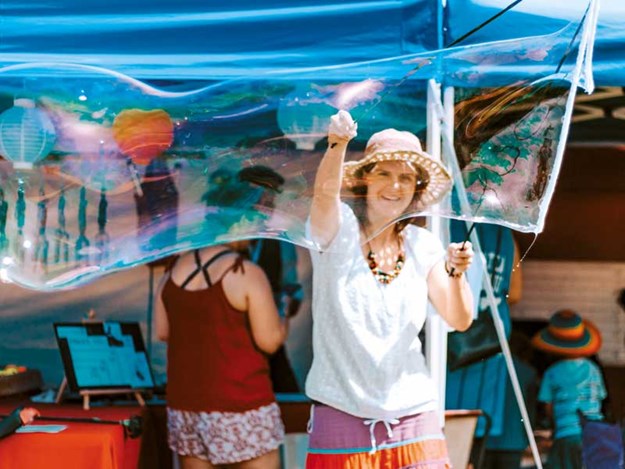 |
The fair has entertainment Some of the fair buses to appeal to all ages |
I hung onto the weapons side of my career and put my redundancy money into a shooting gallery with tin ducks. The first weekend I opened the shooting gallery, I had the guns chained to the bench like an old-style carnival, but it scared the hell out of me, people pointing them every which way. I quickly put them up on pintle mounts, the same way you’d mount a machine gun on the side of a helicopter. It’s much safer that way.
What are your favourite fairgrounds?
Central Otago is fabulous, and Wānaka is our only pitch there. It’s not the most profitable place to earn our coin, but at the end of the day, we’re doing it for the lifestyle. We hit Wānaka town on Monday or Tuesday, advertise hard out, everyone sees the posters on Monday and Tuesday, but by Saturday those people are gone and the ones who do come, they aren’t there next year.
It takes a lot longer to crack the locals who are probably a little more conservative, when they see a lot of house trucks on the shores of Lake Wānaka. Ōamaru is another nice place; we enjoy hanging out with the steampunkers. And, right now, I’m parked outside a building called The Hangar, all copper, cogs and corsets. It’s a steampunk workshop in Whanganui run by another gypsy-fair house-trucker.
What do you do on non-fair days?
We’re only parked up together three nights a week, and because I plot the layout, I make sure it varies every week. I shift people around, so they’re not with the same neighbours every week but, like every community, you find your tribe within the tribe. During the week, we head off and park on our own for a bit of grounding. The new ones tend to cling together for their first season, but that drifts apart after a while.
How many of you travel together?
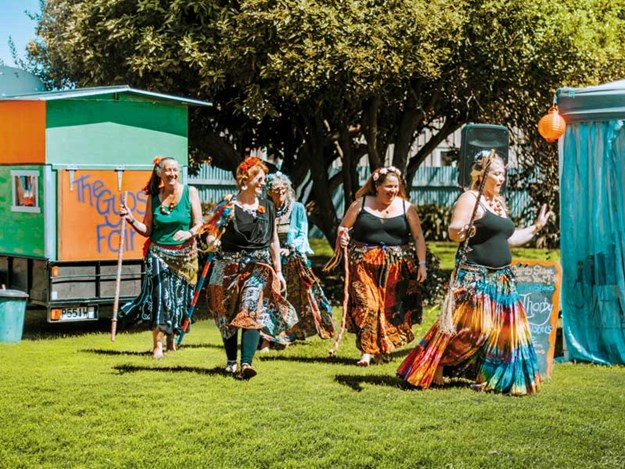 |
The fair is home to around 20 like-minded travellers |
It varies. We’re sitting at around 20 to 21 people at the moment, the optimum is about 26 to 27, any more than that and we’d struggle to get into venues. And in our community, the youngest is two and the oldest is in their 70s.
What other stalls travel with the fair?
Aside from my shooting range, we have a tattooist, a glass-blower, people do stuff with beads and forks and spoons, there’s a tie-dye shop with fabulous women’s and men’s clothing, bouncy castles, rides and, this year, we have a wonderful musician running the stage. It’s fantastic to hear people singing along and clapping and calling for more. We limit the imported side of things because people like to buy things they know you’ve made.
What advice do you give people who want to run away with the fair?
We get people who say they’d love to join all the time. But it’s very much like fishing, we get lots of bites and very seldom land a fish. You need a suitable self-contained vehicle and a stall that complements what we have and doesn’t compete.
The hardest thing for people is to let go of having a pay packet coming in every week. So you need a sound vehicle, minimal or no debt and a slush fund for maintenance. If it’s a bad two weeks in a row and the coffers get low, you don’t want the pressure of a bank manager on your case. To me, debt is the modern version of slavery.
What sort of truck is best?
Get something reasonably modern. A lot of single women join the fair. My advice to them is to get a Japanese truck or bus that’s relatively easy to drive and cheap to maintain. So many people have a dream, then someone sells them an old 1950 Bedford house truck that’s been sitting on their property for years.
But the brakes are shot, the house is falling apart, and someone just wanted to get shot of it. You can make a lovely little house on a modern, reliable 1980s or 1990s Japanese truck. You can make anything look funky. It’s like a grown-ups’ playhouse, and there are no rules about what you can and can’t do - so long as it complies with the LTSA.
What tips have you picked up?
Simplify your needs. We have a 12-volt system, mainly for running the fridge and charging devices and lighting. We don’t have a TV. We have a small freezer for making ice cubes, and we buy fresh and cook often. We run the kitchen as our grandmother would have, and we don’t waste food.
I presume there's a foretuneteller at the fair; Do you know what your future holds?
This is my retirement. As long as I can do this, I will continue. It isn’t about money - it’s about exploring and meeting people and doing what you love.
To find out when The Gypsy Fair is in your region, visit gypsyfair.nz

